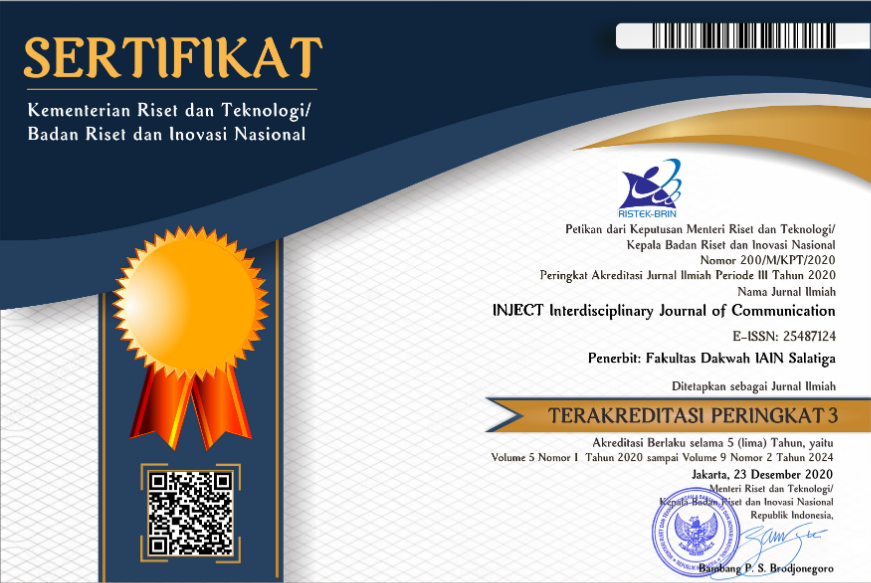Establishment of Children's Moral (Case Study of Temporary Suspension of Entertainment Program Dahsyat by Indonesia Broadcasting Commission)
Abstract
Many media companies in Indonesia intentionally or unintentionally produced program that do not educate people, especially the children by ignoring moral value without adhering to ethics of media broadcasting which is regulated by Indonesian Broadcasting Commission (KPI), so they neglected the regulations. They only broadcasted top rated entertainment program for financial profit without considering the effects towards the society. Media no longer educate the people, but trapped in the logic of market. The purpose of the research is to find out media broadcasting ethics in establishing children’s moral in ‘Temporary Suspension of Entertainment Program Dahsyat by Indonesian Broadcasting Commission (KPI)’ which was analyzed by Bandura’s Social Learning Theory and Agenda Setting Communication Theory by Mc Combs and Shaw. The advantage of the research is to find out the application of the broadcasting ethics in a media. Research method used in this research eas qualitative methods. The final result of the case analysis which was elaborated by using those theories are: 1) The case which was analyzed by Bandura learning theory according to Broadcasting Code of Conduct (P3) and Broadcast Program Standards regulated by Indonesian Broadcasting Commission (KPI), entertainment program broadcasted by RCTI “Dahsyat” breaks the rules because the program did not educate and establish moral of the children, therefore Indonesian Broadcasting Commission (KPI) suspended the program for three days as punishment. 2.) The case analyzed by Agenda Setting Communication Theory by Mc Combs and Shaw (1972), entertainment program broadcasted by RCTI “Dahsyat” was only for entertainment purpose, therefore it was considered unimportant. However, it became important from the audience point of view because media considered it important as well as the theories.
Keywords
Full Text:
PDFReferences
Anshar Akil, M. (2014). Regulasi Media di Indonesia (Tinjauan UU Pers dan UU Penyiaran). Jurnal Dakwah Tabligh, 15(2), 144.
Anshar Akil, M. (2014). Regulasi Media di Indonesia (Tinjauan UU Pers dan UU Penyiaran). Jurnal Dakwah Tabligh, 15(2), 144.
ArRaniry. Khaironi, Mulianah. 2017. Pendidikan Moral pada Anak Usia
Dini. NTB : Jurnal Golden Age Universitas Hamzanwadi Vol. 01 No. 1.
Baharuddin. (2009). Pendidikan & Psikologi Perkembangan. Jogjakarta:
ArRuzz Media
Cindoswari, A. R., Abidin, S., Herman, H., Prodi, D., Komunikasi, I., Batam, U. P., Prodi, D., Komunikasi, I., Batam, U. P., Manajemen, D. P., & Batam, U. P. (2017). AGENDA SETTING HARIAN TRIBUN BATAM DALAM PEMBERITAAN. Jurnal Komunikasi Dan Media, 2(1), 1–12.
David Silverman. (2001). Doing Qualitative Research a Practical Handbook. London: Sage Publications.
Deviana, G., Astuti, I., & Ali, M. (2016). Pengaruh pola asuh orang tua terhadap moral anak usia 5-6 tahun. Pendidikan Anak Usia Dini FKIP UNTAN, 1–13.
Fachrudin, Andi. 2014. Dasar Dasar Produksi Televisi: Produksi Berita, Feature, Laporan Investigasi, dan Teknik Editing. Jakarta: Kencana Prenada Media Group.
Fajar S. Teori Belajar. Surakarta : Universitas Negeri Sebelas Maret Ibda, Fatimah.2012. Pendidikan Moral Anak Melalui Pengajaran Bidang Studi
PPKn dan Pendidikan Agama. Banda Aceh : Jurnal Ilmiah Didaktika Vol. XII, No. 2, UIN
Huitt, W. (2006). Piagets Theory of Cognitive Development. Educational Psychology Interactive.
John.W. Santrock. (1995). Child Development. Boston: McGrow-Hill.
Joni, D., & Hamid. (2002). Perkembangan Industri Televisi. Manajemen Penyiaran Televisi, 1, 1–43.
Kohlberg, Lawrence.1997. Tahaptahap Perkembangan Moral.Jakarta : Kanisius.
Mc.Comb, Maxwell E., "The Agenda Setting Approach, In Nimmo, Dab D, and Sanders., Keith R., 1981, Handbook of Political Communication, Sage Publication, Beverly Hill
Mc.Comb, Maxwell, and Ghanem Salma I., " The Convergence of Agenda Setting And Framing" In Stepehen D.Reese,et.all., 2001, Framing Public Life Perspectives on Media and Our Understanding of Social World, Lawrence Erlbaum Associates, London
McQuaill, Denis, 1983, Mass Communication Theory, Sage Publication, London
Muryono, Sigit 2009. Empati,Penalaran Moral dan Pola Asuh. Yogyakarta: Gala Ilmu Semesta
Morrison. (2005). Media Penyiaran, Strategi Mengelola Radio Dan Televisi. Ramdina Perkasa.
Nurwanto. 2018. Teori Pengertian Penyiaran. Yogyakarta : Univeritas
Mercu Buana.
Robert Coles. (1997). Menumbuhkan Kecerdasan Moral Pada Anak. Terjemahan.
Sobirin, M. (2019). Agenda Setting Theory Pencalonan Walikota Jambi di Media Seru Jambi . com. JURNAL MAUIZOH, 3(2), 65–82.
Suprapto, Tommy.2006.Pengantar Teori Komunikasi.Yogyakarta : Media Pressindo.
Syamsu Yusuf. (2000). Psikologi Perkembangan Anak Dan Remaja. Bandung. PT Remaja Rosdakarya.
Wicaksono, Luhur. 2015. Keefektivan Pemodelan terhadap Peningkatan
Efikasi – Diri Akademik Siswa SMP (Kajian Teoritik Aplikasi Teori Bandura). Jakarta : Jurnal Visi Ilmu Pendidikan 6 (3)
berita online : https://www.cnnindonesia.com/hiburan/20170922190044-220-243431/5-program-televisibandel-yang-pernah-disetop-kpi
DOI: https://doi.org/10.18326/inject.v6i2.119-130
Refbacks
- There are currently no refbacks.
Copyright (c) 2022 lakna tulas'un

This work is licensed under a Creative Commons Attribution 4.0 International License.








